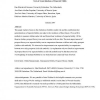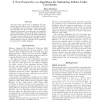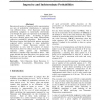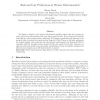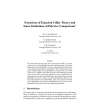121
click to vote
ALDT
2009
Springer
14 years 12 months ago
2009
Springer
Abstract. We axiomatically characterise a class of algorithms for making sequential decisions in situations of complete ignorance. These algorithms assume that a decision maker (DM...
126
click to vote
NECO
2002
15 years 1 months ago
2002
In this work, we discuss practical methods for the assessment, comparison, and selection of complex hierarchical Bayesian models. A natural way to assess the goodness of the model...
104
click to vote
MANSCI
2007
15 years 1 months ago
2007
This paper explores biases in the elicitation of utilities under risk and the contribution that generalizations of expected utility can make to the resolution of these biases. We ...
AIPS
2000
15 years 3 months ago
2000
The paper takes a fresh look at algorithms for maximizing expected utility over a set of policies, that is, a set of possible ways of reacting to observations about an uncertain s...
106
click to vote
JURIX
2007
15 years 3 months ago
2007
The outcome of a legal dispute, namely, the decision of its adjudicator, is uncertain, and both parties develop their strategies on the basis of their appreciation of the probabili...
ATAL
2006
Springer
15 years 5 months ago
2006
Springer
Abstract. We introduce take-it-or-leave-it auctions (TLAs) as an allocation mechanism that allows buyers to retain much of their private valuation information, yet generates close-...
106
click to vote
ISIPTA
1999
IEEE
15 years 6 months ago
1999
IEEE
Bayesian advocates of expected utility maximization use sets of probability distributions to represent very different ideas. Strict Bayesians insist that probability judgment is n...
CP
2003
Springer
15 years 7 months ago
2003
Springer
We discuss the problem of scheduling tasks that consume uncertain amounts of a resource with known capacity and where the tasks have uncertain utility. In these circumstances, we w...
112
click to vote
ACMICEC
2003
ACM
15 years 7 months ago
2003
ACM
We discuss a solution to the winner determination problem which takes into account not only costs but also risk aversion of the agent that accepts the bids. We are interested in b...
118
click to vote
ISIPTA
2003
IEEE
15 years 7 months ago
2003
IEEE
We contrast three decision rules that extend Expected Utility to contexts where a convex set of probabilities is used to depict uncertainty: Γ-Maximin, Maximality, and E-admissib...

